#my setting
Text
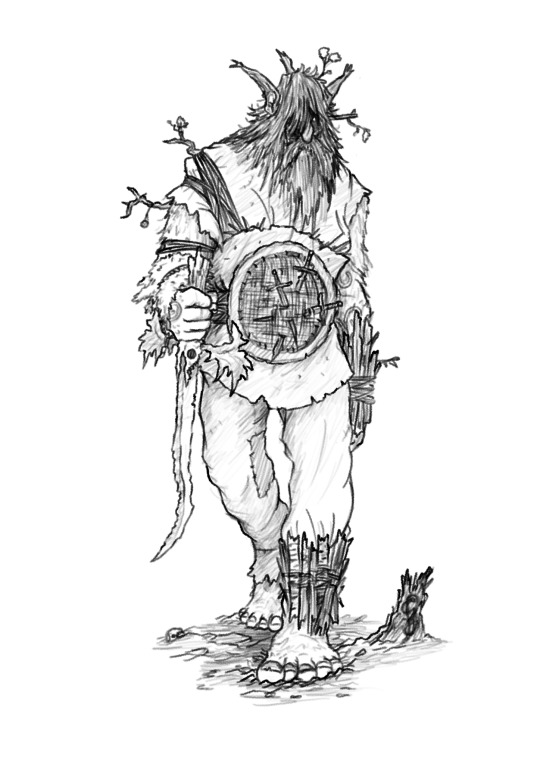
Known by many as "Elf Giants", Leshin are the dour protectors of the ruined groves. They roam within the last remaining forests of the world; guarding the fauna within from potential hunters.
Leshin are a dying race in the Great No-Man's Land. Their homes were long destroyed and they cling to whatever still remains. Some have turned murderous, while others have become nihilistic and depressed. Yet their hope and dedication to the preservation of forest life, is what keeps this ruined world from wasting away.
-------------------------
Made 12th of September 2022
Part of my Fantasy setting - Warmonster
#my art#artists on tumblr#elf#leshy#fantasy#illustration#dark fantasy#modern fantasy#my setting#warmonster#worldbuilding#digital art#leshin#leshi#elf giant#fae#forest#nature#protector#giant#folklore#I'm very proud of this one
80 notes
·
View notes
Text

Anthericum

This is a constellation for my setting with Eclipse (the character from the last post)
18 notes
·
View notes
Text
Setting Map: The World (2125-2800)
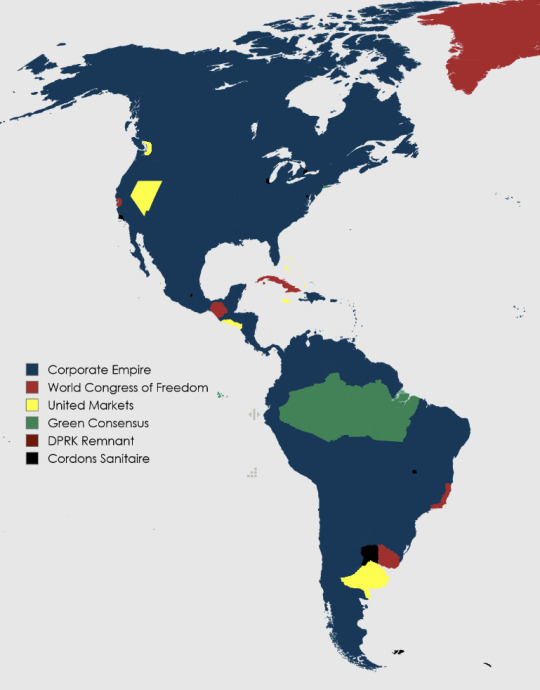
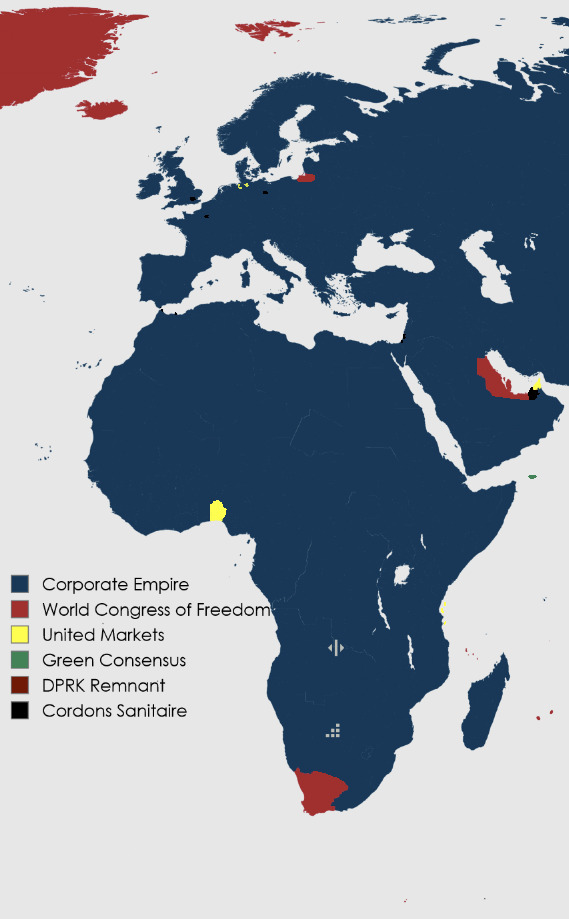
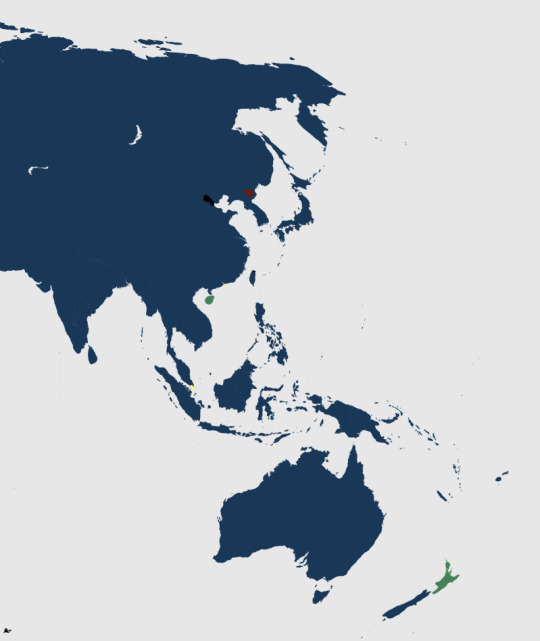
The Corporate Empire (CorpEmp): The big kahuna, and hegemonic empire to end all hegemonic empires. Their territory is more porous than they like to let on, as there are plenty of survivalist, pacifist, and millenarian enclaves (or folks that forgot to fill out their census paperwork) known collectively as the Reserves.
World Congress of Freedom (WCOF): Several urban centers and islands were designated as Cordons Sanitaire, semi-independent penal colonies where aaaalllllll the people that didn't want to be CorpEmp could go live. After Emperor Ignacio died in 2100, multiple Cordons revolted. The left-wing coalition of rebels formed the WCOF. Although they didn't overthrow CorpEmp, they won the next best thing: CorpEmp's begrudging recognition.
United Markets (UM): The right-wing half of the Cordon rebellion, though they preferred to bribe their way to freedom from CorpEmp than fight. The peace treaty that ended the Cordon Rebellion was signed in Las Vegas (all parties involved got comped rooms!) They are an equal mix of Anarcho-Capitalists and billionaire/tech-bro megacorps.
Green Consensus: The Long Island Cordon was full of hippies and less smelly environmentalists, so CorpEmp didn't invest too many resources in monitoring them. Then Ignacio dies, and all hell breaks loose across the Cordons. While the new Empress unleashed Operation JANISSARY on the rebels, the newly christened "Green Consensus" plants their environmentally friendly flag on the Amazon, Galapagos, and various islands (how Heinan and North Island ended up joining is a mystery). CorpEmp didn't contest, after fighting a 25 year war with two other factions.
DPRK Remnant: No one knows why the remains of the Democratic People's Republic of Korea got the San Marino treatment during the creation of CorpEmp. All modern historians know is that the Mount Paektu bloodline were left alone to rule their namesake. Not much info comes out.
Cordons Sanitaire: These are the ones that didn't make it. CorpEmp was able to take these Cordons during the Rebellion and kept them as Cordons in the Treaty of Las Vegas. It's Escape from New York 24/7/365 here.
Common Prosperity Coalition (CPC): They're not on the map, because no one wants them on it. They're the descendants of the many, many criminal organizations that survived WW3, the Warlords' Wars, and the creation of CorpEmp. They like to think they're on par with the Big Three (much to the Big Three's chagrin).
#my setting#setting#worldbuilding#setting lore#setting map#feedback appreciated#need to add more wcof/um/cordons in the 3rd map but not sure where
7 notes
·
View notes
Text
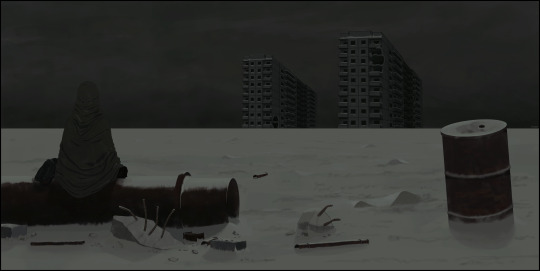
#post apocalyptic#digital art#illustration#art#artwork#my setting#dark art#scifiart#русский арт#dystopic
9 notes
·
View notes
Photo

Blackhorn Soldiers
Generated by Midjourney
Soldiers under the command of Daniel Burke, weapons manufacturer turned military leader after the cataclysm and arrival of the Peregrine gods.
#ai art#cyberpunk#soldiers#dystopian#peregrine#blackhorn#dark#art#worldbuilding#midjourney#my setting
211 notes
·
View notes
Text
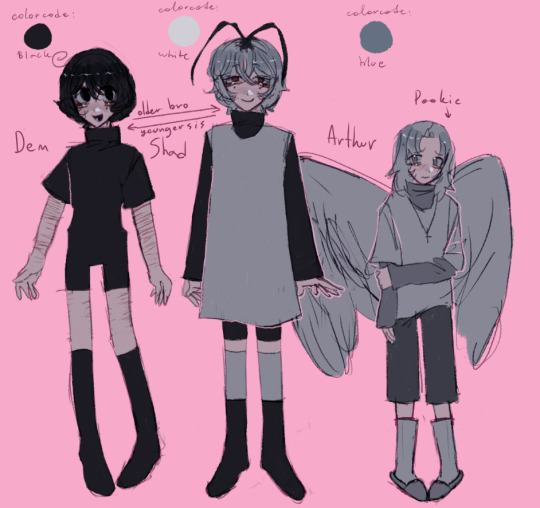


I made a focking setting
Im losing my mind my head is numb I am not fine
#aaaaaaaaaa#sketch#oc art#art#setting#my setting#artists on tumblr#art on tumblr#illustration#jirai kei#laboratory#laboratory setting#>:3
7 notes
·
View notes
Text
The vowing table in the landsaint’s barracks was lopsided as Raam peaked over the lip of Aurenna outside – and not just because one of its legs was worn too short. A saintsworn was absent; Nojjeth never reported in last night. Her silver handprint, shaped to her large Dromag hand, was bare. But the Greshtal Ulashkr and the Aajakiri Fhelleid planted their palms on their silver handprints, connected by a thin silver ring to the golden print that held Imreb’s hand.
A landsaint’s vowing table was where they and their ‘sworn made their vows to their community. The ‘sworn vowed to the saint, who swore them all to Raam himself. He was represented at the center of the table by a magically lit candle upon a raised golden circle, connected by a single gilded line to the landsaint’s handprint.
Ideally, the circle of hands is complete before vows are made. But exceptions are often necessary.
“Before we begin,” whispered Imreb so as not to disturb the candleflame, “do either of you know of Nojjeth?”
“Nay, saint,” boomed Ulashkr, the candleflame vibrating with his heavy voice. “I have not seen her since yesterday’s vowing.”
“Nor have I,” admitted Fhelleid, her brow-plates still. “Perhaps she got lost.”
“No jokes at the vowing table,” chided Imreb. She pushed her hand into the golden handprint and turned to face Fhelleid. “Ser Fhelleid. Your saint requires you patrol the undermarket and keep watch for hooligans and burglars. Do you so vow?”
“So I vow, saint, by witness of Raam.”
Imreb turned to Ulashkr. “Ser UIashkr. Your saint requires you seek out absent Nojjeth and return her here by nightfall. Do you so vow?”
“So I vow, saint, by witness of Raam.”
Closing her eyes, Imreb made her own dedication: “Landsaint Imreb makes her vow to seek out the recent apprentice of jeweler Glaa’ib for interview regarding an ongoing investigation. By witness of Raam.”
“Saint,” interjected Fhelleid, “I should assist you. I am familiar with this matter.”
Imreb opened her eyes to glance at Fhelleid. Was she the one who suspected her? But the central candleflame blew itself out.
“The vowing is complete,” said Imreb sternly. “Keep your vow as promised, Raam your witness.”
Fhelleid’s brow-plates sank, but she said nothing. The three left the barracks and went to pursue their vows.
-
Thus spake Ngashiik:
The world kills emptiness on sight. Empty your mind and allow the world to murder it. Take in the world writ large, and return the favor. At the bottom of that darkness is a light: Raam.
Raam is the zenith of the heavens; Raam is the nadir of the mind.
-
The landsaint’s barracks were on the other side of the river from the bulk of the surface town. A sandstone-brick arch crossed the flowing coppery water to the sandrock formation on the other side which hid the town. Only smoke vents and tall crimson banners revealed its presence to the observant.
Imreb followed the worn road to the north gate: two enormous slabs of engraved sandstone, presently cracked wide enough for single-file trade caravans. Nodding at the guards, who bowed gently at her presence, Imreb slipped between the rear of a grain-bearing wagon and a beast of burden behind to enter the city.
Under rays of morning light slanting through cracks in the west, the huts carved from the sandstone gleamed bright. Smoke from last night’s recently-extinguished braziers filled the air, the perfume of foreign wood and ash leaving behind a thick pale haze. But through the haze one could easily see the brightly-colored murals, frescoes, and graffiti impressed upon nearly every open flat surface of the cavern.
Imreb nearly ran into a Greshtal carrying a crate of produce, but ducked just in time thanks to her saint’s reflexes. The caravan she’d followed in was being unloaded, state supplies being doled out to various warehouses and storerooms, and trade goods being delivered to the nearby elevator to the underground.
Imreb passed a Dromag laborer toting a great pot of spice as big as she was. With each step the overfull pot dashed fine ruddy powder into the air, a fair amount clinging to the Dromag’s beard. It didn’t seem to bother her, but Imreb caught a whiff and wondered how it couldn’t, unmistakable the hot, pungent smell of kezzac root. Imreb quickly zipped away from the puffs of dust and pursued a nearby passage to the right.
Imreb followed the graffiti-scrawled alley along the outer rim of the rock-cliff’s cavern, occasionally passing shafts of light from the left where the alley opened up into one of the major chambers. The rest of the way was darkness – but the eyes of a saint, blessed by Raam, saw light where it was scarce. The alley curved first west, then south, and the dim graffiti grew more and more desperate and more and more profane as Imreb neared the southside.
Finally the passage opened up into the south gate cavity, the old market. Most merchants had fled underground long ago, but a handful still stubbornly remained, like the old jeweler, Glaa’ib. He sat on a stool in front of his small shop, whistling tunelessly and stirring a kettle with a stick – both spoon and pestle. He was close enough to the gate to catch the morning breeze, but just out of the sun’s harsh light to hold onto the cool shade.
He stopped whistling and raised a great red-and-black Dromag hand to wave Imreb over. “Saint, saint!” he cried with his old raspy voice, a pitch higher than Imreb’s ears would have liked. “Come, come! Breakfast is near ready, and a good blessing is needed!”
Imreb crossed the empty old market to the elderly Dromag, his sparse shock of still-red hair glistening with condensed steam from the brass kettle. She took a look inside, but the smell told her long before what he was cooking: mashed and stewed and mashed-again silc beans, the grey flesh of the blue legumes thickening endlessly into a dense, viscous paste, popular among elderly Dromag whose teeth have lost their edge.
Indeed, Glaa’ib grinned at Imreb, his once-pointed teeth now rounded like tombstones. “A pleasure, a pleasure! Moreso when the miisilc is blessed, yes?”
Blessing food was a formality; it was nowadays known that many factors played into the safety of food, and none were spiritual. But the saints and priests allowed the faithful to still believe. Imreb held her hand over the kettle, in the cooler upper reaches of the steam, and mumbled a prayer to Raam, and to Byilo, old Saint Holy of Right Cuisine.
“A pleasure twicefold, saint!” Glaa’ib reached behind for a cracked and chipped bowl. He gave the miisilc a last good pound with the spoon-pestle and used it to tear off a steaming glob of slop into the bowl, and offered it to Imreb. “Here, here, saint! Eat, eat!”
Imreb glanced at the grey mush with barely-hidden fear. “No, thank you, Glaa’ib.”
“No, no, saint!” said Glaa’ib with a shake of his head, his red-and-white beard swaying back and forth. “No harsh spices. You are Aajakiri, I know such flavors do not favor you.” He extended the bowl further.
“Thank you, Glaa’ib, but I’m fine.” Imreb tried to push away the bowl.
“Oh, oh, of course!” Glaa’ib exclaimed, withdrawing the bowl. “The saint likes it sweet!” The Dromag reached to the side for a small pot of white powder. With his large hand he grabbed a mighty pinch of sugar and poured it into the bowl, then offered it again.
“Glaa’ib, no!” said Imreb, nearly losing her patience. “Thank you, but I’ve already eaten.” It was a lie, but she’d rather starve than try to swallow miisilc, no matter how sweet.
Glaa’ib’s smile finally fell a bit, hiding more of his teeth. “Very well, saint,” he said, taking the bowl for himself. He dipped a couple of fingers into the miisilc to scoop up a bit of the bean-paste. “How may I –” he stuck his fingers in his mouth and began chewing, “– helb you?”
Imreb sighed. “Tell me about your recent apprentice.”
Glaa’ib groaned. “Goo’ stuff,” he mumbled through his chewing.
“...Glaa’ib?”
“Sorry, sorry,” mumbled the Dromag after he swallowed. “Mrogem, you mean. Nasty brat. No eye for detail. Couldn’t tell emerald from peridot, sapphire from aquamarine, diamond from quartz – much less cut anything right. Told him so one day and he got so angry, I never saw him again.” He wielded his spoon-stick like a club. “Give the boy his dues, I would, if he dared come back!”
“No weapons,” warned Imreb.
“Oh, it’s just my stir-stick,” said Glaa’ib, returning it to his kettle. “Don’t contort yourself.”
Imreb pulled the flawed thoughtstone from her pocket; she winced at its speech, having forgotten to brace her brow-plates. She showed it to the jeweler. “Did he cut like this?”
With his cleaner hand Glaa’ib took the sapphire and gave it a brief once over. “Hm. Looks similar. Seems he’s still been practicing, but it’s still shit.” He brought the sapphire closer and squinted. “Is this thing filled?” he asked, shaking his head. “Raam above, why’d you use it?”
“I didn’t fill it,” said Imreb. “Someone else did. I’m trying to figure that out.” She held out her hand to take back the sapphire. “Do you testify this is Mrogem’s handiwork, Glaa’ib?”
“I so testify, saint,” said Glaa’ib, handing back the thoughtstone. (She wiped it quickly on her sleeve before putting it away again.)
“Do you know where I might find Mrogem?” Imreb asked.
“Cursed if I know,” Glaa’ib admitted. “Maybe ask some of the young Dromag?” he suggested. “You know the rascals, too big for their feet. Barely grown their beards in, scrawling profanities on the walls. Like, like…”
“Kheloz, perhaps?” offered Imreb, optimistic.
“Yes, yes! He’s one of their lot. He might know where to find blasted Mrogem.”
“Thank you, Glaa’ib. You’ve been very helpful. Blest day.”
“And you, saint, a blest, blest day!” returned Glaa’ib, but Imreb had already turned to leave.
-
This ancient dune overlooking the fields flanking the Heljaar river as it wound its way east to the distant coast was Imreb’s favorite place to meditate. But her eyes were open, scanning the landscape before her, discerning discrepancies. Raam was high in the sky at his apex, his light harsh upon Kolqust, but illuminating the river’s arc like the bent swords of ancient desert tenvo, a wicked streak of bronze, ending in a sharp point on the distant horizon.
Before the farmland disintegrated into sand, the fields of precious crops clung to the precious coppery water. The fingers of grain and stalks of beans danced to the tune of the wind rolling down the river’s course. She listened to that familiar sound, and her mind began to drift towards contemplation…
Wait. Her ears twitched as she focused her hearing. That wasn’t the song of the wind – not entirely. There was a distinct melody hovering over the land, almost haunting it. She slid down the dune to follow the tune.
Tracing the small irrigation rivulets separating the fields, she located the source: a young Dromag in a fallow field plucking at his tellish, a stringed instrument with three courses of two strings each, a seventh drone string, and a wide, deep body. Unnoticed, Imreb listened silently.
It was a deep-desert Kolqusto ballad Imreb didn’t know the words to. The player didn’t, either, or else didn’t want to sing for some other reason. He played soulfully, jostling the tellish on some notes for extra vibrato. His large fingers gracefully danced upon the frets, wringing from this piece of molded wood and wrought metal one of the sacred blessings of the world: music.
“Kheloz.”
The musician missed a note, spoiling the composition. He stopped and craned his neck to see Imreb. “You’re a very sneaky saint,” he observed with a sigh.
“And you’re a wonderful tellish player,” she added.
“I imagine,” Kheloz said, laying down his instrument flat on his lap, “that you’re not here to compliment me. Is it about the thoughtstone from yesterday? I don’t have it on me.”
Imreb’s listening brow-plates said he was lying, but she decided not to pursue it. “Not that,” she said. “I’m looking for someone. A friend of yours.”
Kheloz fiddled with the strings idly. “I’ve got a lot of friends. You’ll have to be more specific.”
“A Dromag,” said Imreb, “by name of Mrogem. Apprenticed under Glaa’ib the jeweler.”
“Not for very long,” Kheloz muttered. “Yeah, I know him. Deep-desert bastard. Bet the ‘prentice job was a grift. He’s always on some grift.”
Imreb squatted next to seated Kheloz. “Where could I find him?”
“And why should I tell you?”
Imreb narrowed her eyes, her brow-plates contorting in what she hoped the young Dromag would recognize as a threat-display. “Because I’m your landsaint.”
He met her eyes for a moment, but didn’t seem to take notice of her brow-plates. He stared back for a moment before relenting, looking down at his tellish. “Yeah, yeah…fine.” He nodded his head towards the main rock of the above-ground city. “Like I said, he’s deep-desert. But he lives away from his tribe, in some ruins a few miles south of town, all by himself. I’ve never been there, so that’s all I know, saint.”
Imreb stood, wiping dirt from her legs. “Do you stand by this testimony?”
Kheloz sighed, and gave his tellish a dissonant strum. “I so testify,” he groaned, as if his mother had just ordered him to bed.
“Good, good. Blest day, Kheloz.”
“Blesdy, saint.”
-
Raam hung low in the east, nearly over the lip of the world, casting the desert into bifurcate shades of bruise: the sky a deep purple, the sand a vibrant orange. The concentric azure flowers of the tall gyec cactus took their cue to bloom under the now-visible swarms of spirits above. To the distant northwest the land began to rise, first as tall dunes, then high foothills, then farthest away, the silvery cliffs and peaks of the Raamo mountains at the center of Aurenna, wherefrom the holiest of priests officiated in their sacred temples.
A sudden evening breeze came down the side of a nearby dune, casting a spray of fine sand in Imreb’s direction. She squinted her eyes, tightened the scarf covering her mouth and nose, and fluttered her brow-plates to keep their crevices clear. Heading out deep-desert was far from ideal, but it was part of her duty as landsaint of Ab’Heljaar and its surrounds.
She knew little of the desert here, save for a handful of landmarks. To the west were the relatively recent ruins of an abandoned fort, from a few centuries ago when Kolqust was first conquered and established as a temple-state. Farther south were a few more-ancient remains, long since mostly-buried by the sand. The deep-desert tenvo say this land was not always desert, and that a great empire, counter to the ancient Dromag to the north and Aajakiri to the west, once spread across the fertile plains and forests. They claim the rising of the central mountains by Raam cut them off from rain somehow, and the deep-desert tenvo descendants of that empire still curse his sacred name.
There were a couple ruins that Imreb could think of that matched Kheloz’s description, so she sought them out, following dune-valleys south.
There was a sudden rumbling of the sand beneath Imreb’s feet, and she panicked for a second. Had she wandered into a sinkhole, or quicksand? But the rumbling moved away, and a few yards to her right she saw a sandfish, larger than she was tall, its sand-dusted scales glistening in the dusklight, emerge from the ground, followed by another, and another. An entire school of them swam past, each breaching briefly in turn, reaching twice Imreb’s height into the air. They kicked up sand upwind, so she had to flutter her brow-plates again.
Imreb had heard stories of deep-desert tenvo taming these strange beasts, and riding them across the sands. But she doubted it was really possible, for more reasons than she could count. But she had also heard of the feats of the skytrout cavalries of the western swamps (difficult to imagine such a wet place, out here), how they sailed the skies from pond to pond. So maybe such things were possible.
As she watched the sandfish school swim away, she caught a glimpse of a pillar of smoke through the clouds of dust they stirred up. She changed direction and strode through the sand towards it.
Mostly buried in the side of a dune was part of an ancient edifice of worn sandstone brick, a sunshade embedded in the sand held up by pillars engraved in an unfamiliar hieroglyphic. There was a bedroll and collection of reed baskets and clay pots tucked in the covered nook, but right outside was the remains of a fire – still smoldering, so not long extinguished. A half-cooked desert rodent (Imreb guessed the long-tailed gweld) was still strung from a spit over the warm embers.
Cautiously Imreb inspected the camp, also scanning the surroundings for signs of life, but found none. But it seemed obvious to her that someone had very recently been here.
She checked out the reed baskets and clay pots, and their contents. One had the flour of the benquc tuber, seemingly for making gruel in the dirty pot nearby, or flatbreads in the filthy pan next to it. Two small pots next to it held white powders – presumably salt from a nearby salt-plain and sugar extracted from cactus sap. Another basket had foul-smelling dried sandfish steaks, a deep-desert delicacy that nearly turned Imreb’s stomach from the stench. Another held nearly spoiled gyec cactus berries – but maybe the owner planned to make gyec wine from them, it wasn’t clear.
In the darkest corner of the recess, Imreb’s saint-eyes caught a glimpse of another basket. As she neared it, her brow-plates reacted harshly, nearly recoiling completely into her head. She took a look inside: gems of every kind and shape, some filled, some not, some flawed and leaking, some not. They spoke in a horrible chorus of pain, the cacophony like listening to the entire night sky all at once, but so much worse.
She reached in to grab a thoughtstone, but her instincts kicked in as she heard a subtle shuffling of sand behind her. She whipped around, calling upon earth spirits to turn her hand to stone.
She caught the rough blade aimed at her head with a hardened palm, wrapping her fingers around it before it glanced off completely. Her attacker was a wiry-bearded Dromag with a shaved head, wielding a bronze “self-defense implement,” and clearly shocked at Imreb catching it so effortlessly.
Still holding the weapon, Imreb ducked low, sweeping a leg under the Dromag’s, knocking him flat on his back, simultaneously wrenching the blade from his hand. She tossed the sword into the air, flipping it to catch it by the hilt. Before the Dromag could catch his breath, the tip of the sword was pointed at his throat.
“Mrogem,” Imreb said, “you’ve just attacked a saint.”
Mrogem looked into her eyes to verify, and fear washed over his face, tightening the lines of his brow. But he returned, “I’ve just attacked a stranger snooping around my belongings. That’s defense of property, saint or no saint.”
“Perhaps try diplomacy next time,” Imreb suggested, “before immediately reaching for a blade.” She pointed back at the thoughtstone-filled basket. “What use does a Dromag have for so many thoughtstones?”
“What?” Mrogem glanced quickly at the basket in the shadowed corner. “Those’re just random gems I found. Honest.”
Imreb sighed and pointed at her brow-plates. “Don’t you recognize an Aajakiri when you see one? I can’t help but hear those leaking ‘stones.”
“Leaking?” Mrogem’s eyes went wide. “What do you mean? They’re cut just fi-” He shut himself up before incriminating himself further.
“‘Just fine,’ hm? You don’t cut as well as you think.” Imreb pulled out the leaking sapphire from her pocket and tossed it down to Mrogem.
He caught it in his hands – albeit clumsily – and looked it over. “Looks fine to me,” he said.
“Glaa’ib was right,” mumbled Imreb just loud enough for Mrogem to hear. “You have no eye for gemcutting.”
“Saint Imreb?”
Imreb planted a foot firmly on Mrogem’s chest before turning toward the speaker, stood at the top of the dune. It was her ‘sworn, the Greshtal Ulashkr. “Ulashkr?” Imreb called back. “What are you doing out here?”
“I was seeking out Nojjeth to honor my vow,” he said solemnly.
“Good,” said Imreb with a nod. “I’ve just honored mine. Help me bind this tenvo and I’ll help you finish honoring yours.”
“I’ve already honored it,” said Ulashkr, his face a grim mask. He pointed east.
Against the black backdrop of the newly fallen night, Imreb saw crimson carrion birds circling in the sky.
“No…”
-
Thus spake Walfa, Saint Holy of Right Burial, as she was buried:
“It is the blessing of the dead to walk no more.”
8 notes
·
View notes
Text
For a long time, it was assumed that for each creature C(n), there is at least one creature C(n-1) that created it, with C(0) being either Al'Guur or Nash'Ta'Zuu.
These days we know that it is not true. There are creatures we refer to as "Aberrations" that can't trace their origin back to either of these primal forces. Some early theories suggested that these creatures instead have Atrisal as their C(0) (while not really bothering to explain where Atrisal came from) but there have been many cases where the opposite has been proven (Ropur, 143) such as with Beholders or Cthulhu.
In this paper, I am going to propose the existence of two more of what I will call original Aberrations: Yabis and Sepu, the Flesh and the Bones.
Introduction to Professor Captain Kristina Pham's paper "On the origin of Aberrations"
55 notes
·
View notes
Text
i came up with a worldbuilding idea for my aurena setting about a week ago called Right Shape. when the sun-and-order god Raam came into the world and ascended to godhood, his presence changed the very shapes of the world. rock formations twisted into concentric rings; plants flowered with concentric blooms; even the spots on animals became concentric marks. the tenuvo (the people of aurena) believe these markings are auspicious and good omens. sometimes tenuvo are born with concentric birthmarks, and they are typically revered as saints, or called into service of Raam’s priesthood. Raam’s subconscious desires built this Right Shape into the world bc it is reflective of the shape of the cosmos itself: a set of concentric circles
6 notes
·
View notes
Text
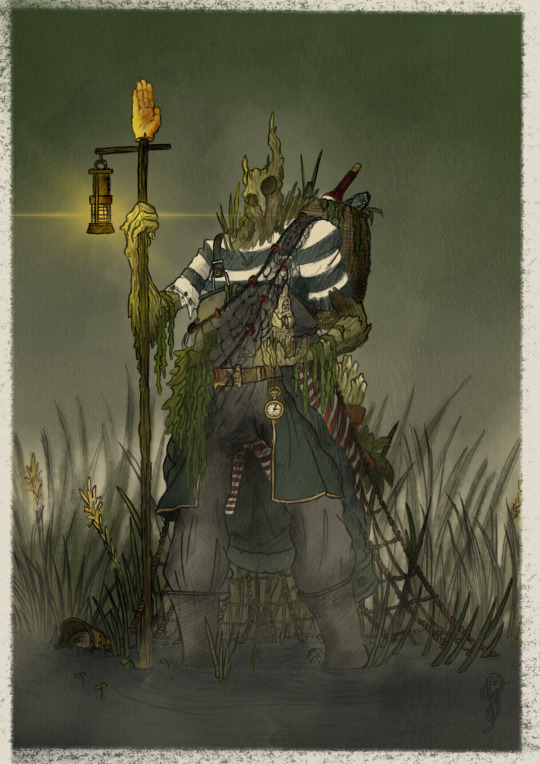
To those who fear the devils that stalk the Belgian waterfronts and canals; do not despair. Roaming the dockyards and coast of the Scheldt is an ethereal creature who will light the way through the murky mists of the Flemish riverlands.
-------------------------
Made 9th of June 2022
A digital piece meant to commemorate the final stages of me and my family moving house. I was asked to make a creature and made up a cryptid/folkloric creature that actively fights against malign creatures of Belgian folklore.
#my art#artists on tumblr#fairy#devil#demon#fantasy#illustration#dark fantasy#modern fantasy#my setting#warmonster#worldbuilding#digital art#digital painting#belgium#flanders#cryptid#folklore#daemon#fey
54 notes
·
View notes
Text
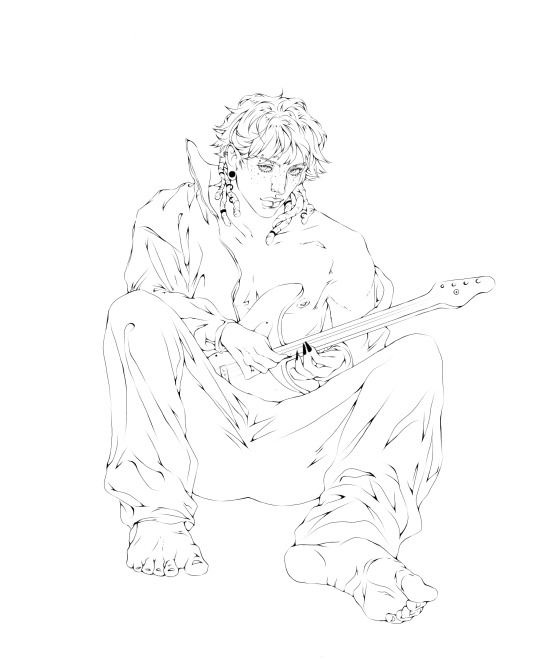
#music#guitar#digital art#artwork#artists on tumblr#retro#vintage#nails#clothes#doodle#books#moon#pirsing#poetry#fandom#my setting#tumblr settings#modern art#graphic design
15 notes
·
View notes
Text
Setting Map: Viceroyalty Latinidad (REWORK)
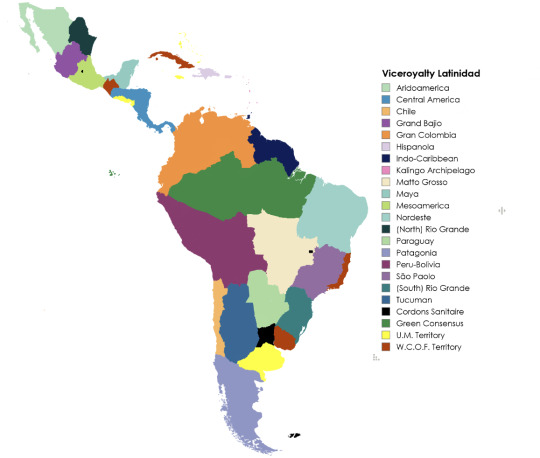
CorpEmp Macrocommunities:
Aridoamerica: Northwest Mexico. Miffed they didn't get the Rio Grande, even in the 2800s.
Central America: Central America plus Panama minus El Salvador.
Chile: Rump Chile run by Tradcath Gremialists. At least they don't have to deal with the Mapuche anymore...
Grand Bajio: North-Central Mexico. Home to massive Neo-Chichimec and Purépecha industrial estates.
Gran Colombia: Colombia, Ecuador, and Venezuela. Bolivar was a corporatist all along!
Hispanola: Haiti, Dominican Republic, and Puerto Rico. The only islands of the Greater Antilles that weren't seized by the U.M. and W.C.O.F..
Indo-Caribbean: Trinidad-Tobago and the Guyanas. The Hindu Heartland outside of VR Jambudvīpa.
Kalingo Archipelago: The Lesser Antilles (sans T-T and Montserrat), home of Carib restorationist movements.
Matto Grosso: Brazil's Center-West. Like to see themselves as the heirs of old Brazil.
Maya: Yucatan, northern Guatemala, and Belize.
Mesoamerica: Central Mexico. Declared the Nahua and Zapotec homelands, dotted with Hispano-Gaelic enclaves.
Nordeste: Brazil's northeast. Finally free from Brazilian internal neocolonialism.
North Rio Grande: Coahuila, Nuevo Leon, and Tamaulipas. Once a Texan satellite state, its relationship with the First Dynasty's home made the N. Rio Grande an influential member of VR Latinidad following its formation.
Paraguay: Slightly larger now that it's acquired the Argentine Chaco. Provinces like styling themselves as the old Jesuit Reductions.
Patagonia: Southern Argentina and Chile, the homeland for the Mapuche people, as well as some Welsh enclaves.
Peru-Bolivia: Peru and Bolivia, back together! Styles itself as Neo-Incan, with a few acquired Japanese stylings.
São Paulo: Formed from the Brazilian state, plus Minas Gerais. One community of note within is the "Confederado Tribal Zone".
(South) Rio Grande: Southernmost Brazil. Lots of German, Italian, Polish, and Ukrainian enclaves.
Tucumán: Northern Argentina. A Neo-Diaguita and Tonocote project.
Non-CorpEmp Territory:
Cordons Sanitaire: The Falklands, Mexico City, Brazil's Federal District, and a large buffer zone between Buenos Aires (U.M. territory) and Uruguay (W.C.O.F.).
Green Consensus: A good chunk of the Amazon, Galapagos, and a restored Montserrat.
United Markets: The militarist Milleist Free State (Buenos Aires), Central America's Crypto Coast, Jamaican FVEM , and the Sandals-Bahamas Free Market Zone.
World Congress of Freedom: The Zapatista Federation (Chiapas), Cuban Republic, the Rio-Santo strip (Brazil), and Peoples Republic of Uruguay.
Reserves: Millenarianist, pacifist, and survivalist enclaves across the Viceroyalty, and several (formerly) uncontacted peoples in the Amazon.
CPC Activity: Organized criminal groups use the Mexico City and Brasilia Cordons Sanitaire as staging grounds for trafficking operations. Massive depots are usually seen built and rebuilt in the Amazon. Several descendants of Guantanamo detainees have formed pirate groups in the Caribbean.
12 notes
·
View notes
Text
decided to call the magic points in my system Breath.
a big part of the design behind my ttrpg is giving mechanics in the system logical, flavourful names.
so like, for the "active defences" which are saving-throw equivalents, you have Focus, Evade, Withstand, and Parry. the names for them are Verbs because each of them requires you to actively attempt to withstand or overcome something.
for passive defences, Armour, Ward, Barrier, the names are nouns. same with resources like Stamina and Breath. they're nouns.
i want to make a obvious distinctions between things you have to Actively attempt to use by making them verbs, partially to cut down on unnecessary or inelegant words and phrases. "make a constitution saving throw" is ugly and long, "roll to Withstand" is punchy and elegant.
and aside from that, i want to minimize using "gaming" terms to keep flavour. "Magic/Mana Points," "Spell Slots," "Hit Points," etc. are all fine, but their use of game terms like "Points" and "Slots" just kinda pull a bit out of the world and are a little Too silly sounding imo.
i chose Breath for magic because i wanted a word that sounded like. ephemeral to represent the in-universe concept of magical reserves. within the setting, there are two main types of magic. "Liquid" magic, which is magic that is in motion, and "Solid" magic, which is magic that is stagnant. Solid magic is inanimate and harder to access, as it makes up the bonds that hold objects together, and to make the magic in the object liquid is also to destroy that object. Living things are made up of both Liquid and Solid magic, the liquid magic flows through the body freely, and can be used with no issue, as it's not bound to anything and easily replaced, but the solid magic can only be extracted via the destruction of the body (aka blood magic). Because of this concept, i wanted a word that represents the idea of a flowing resource within one's body that can be expelled and restored easily. the easiest connection would be some sort of term for a liquid, such as "Font," "Fountain," "Well," or "Wellspring," but those words refer more to the container or body of liquid in totality than the liquid itself, and words like "Flow," or "Flux" don't feel all that fitting. so i decided on "Breath." there's not so much of a connection to liquid, but i don't necessarily think that's a bad thing.
25 notes
·
View notes
Text

4 notes
·
View notes
Text
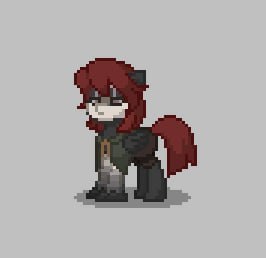
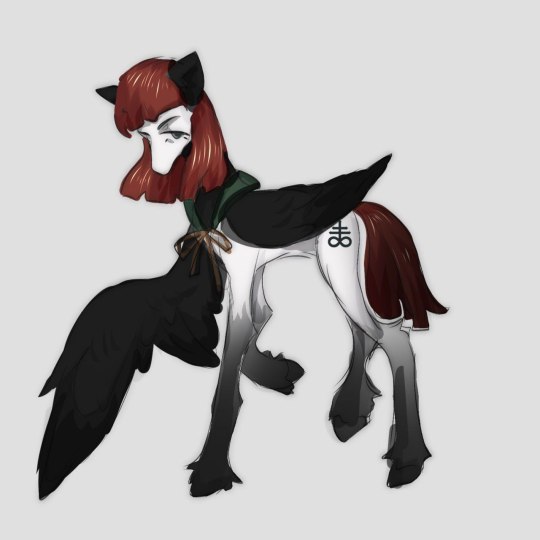
Pony Velvet Moon from the joint setting
5 notes
·
View notes
Text
The descending lift was claustrophobic. The landsaint was becoming an under-landsaint with every jagged tug towards the bowels of the earth. She kept her breath steady and long so as not to panic. A Dromag attendant in the opposite corner of the lift had his arms crossed, and she could feel his hot breath, and smell its pungent spiciness.
The light approached from beneath, piece-by-piece with each pull of the chains. (The bigger cities had automatic lift mechanisms, but these were still hand-cranked.) The landsaint must have begun to hold her breath when the light first appeared, because it escaped in a single burst once they reached the lift’s landing below.
The attendant opened the brass-barred door, letting in more light from the landing. “This floor,” he mumbled, well-practiced but bored, “Market. Shrine.” He stood on his tiptoes to check the landsaint’s irises. “You know this. Blest day, saint.”
The landsaint stepped out of the lift, which immediately began to ascend to pick up more visitors to the city’s belly.
She hated the air down here. Dry and stuffy. Even when the air was cool, it felt hot. She was going to finish her work here and return topside, as soon as possible.
Two half-halberd-wielding Greshtal guards let her through with a nod. The landsaint returned the gesture curtly. Beyond the guarded brass door was a deep-dug city of stone, four stories high, stone stairs winding up and down the sides of stone buildings to stone balconies giving landing for brass doors, wooden planks from surface trees filling in gaps and forming crossings where the stone streets were narrow. Blackflame lamps kept the streets and stairs lit, but the closer to the roof, the darker it became. Up there, tall shadows danced. Only Dromag were short enough for the low ceilings in these reaches, but children of all types daredeviled from ledge to ledge.
The lower two levels were purely commercial, various shops and stores and groceries and boutiques lining the streets and dazzling passersby with brightly painted signs and intricately-woven tapestries. The two levels above were for the homes of the merchants. But not all who did business in this district lived here. Many commuted with their stalls and carts from the lower residential levels via the bigger, industrial lift by the main gates of the surface town.
The landsaint scraped past pedestrians and took in some of the shops and stalls. She saw a smithy selling blades –
– but the smith couldn’t call them blades. It was illegal in this jurisdiction of Kolqust for most tenvo to carry weapons larger than a work-knife. But many smiths circumvented this restriction by selling sharp scraps of bronze that almost looked like blades, but by the precise wording of the law couldn’t be called weapons. All it took was some string, resin, and a suitable length of wood to manufacture a “self-defense implement” at home. The landsaints politely ignored these loopholes; it was their job to enforce laws, not argue them.
– a wooden sign, painted with the words “mostly-meat sausages” (in smaller script beneath: “accepting chit only”), indicated such meats were hawked at the rickety stall where it hung by a lanky Dromag –
– those words being all the butcher needed to claim to bypass a law regulating the use of mineral additives in such products. Dromag had sturdy teeth and hardy stomachs, and could handle a little clay or limestone in their mixed meats. (During ancient times of poverty, clay was a common food source for the Dromag, earning them the now rarely-used sobriquet “clay-eaters.”) Aajakiri and Greshtal, on the other hand, could not digest these things. But when the prices were this low, a chipped tooth or a little indigestion was worth it.
– in a dim corner, lit by an array of colored paper lanterns, sat the waterpipe lounge –
– where the only smoke of griidc could be found in these times, as individual possession and consumption of the narcotic by claypipe had been outlawed by the state about a decade ago, much to the dismay of the large smoking subculture of Kolqust. Begrudgingly, tenvo would pay to smoke in these lounges for an hour, taking up their hoses around the communal waterpipe and allowing the smokemaster to supply them with their fix.
– a beautifully engraved storefront advertised “Oshr’s Fine Jewelry.” Through the open arches of the facade were rows of glass-protected counters bearing precious jewels, rings, necklaces, bracelets, anklets, torques, tiaras, and more. In the back, at a counter operated by Oshr herself, a beautiful face-painted Aajakiri, were displayed the finely cut, delicately-faceted receptacle gems for spirits, future thoughtstones –
– illegal to fill without saint sanction, but not illegal to cut and sell beforehand. Only saints or temple priests are allowed to capture spirits or sell thoughtstones.
The landsaints brow-plates flexed as she listened vaguely in the direction of the jeweler’s shop. Something tickled her brow-plates, and she focused on it.
It spoke of mastery. It spoke of a job well done, a product complete. Satisfaction – of the mind and the chit-purse. A deal. A transaction. A bargain sworn.
The landsaint squinted at Oshr. Her neck gleamed with a brilliant ruby. Personal thoughtstone. Not for sale.
The landsaint’s brow-plates resumed a neutral position as she carried on down the street. Finally she reached her destination: the town shrine. Its set of concentric walls were beautifully engraved and brightly painted, the outer ring etched with the laws of the priests of Raam. The landsaint ascended the radial stairs, passing one circular gate as she did, leaving behind the first circle, representing Uodh, the Void. The next ring depicted the victories of local saints throughout history – this circle represented Uorh, the Word. She passed its gate, leaving her one more circle to pass – Eilh, the World – displaying the triumphs and tribulations of Raam before he ascended to bring the day. Its gate had a door, which she slowly pushed open to enter the outer sanctum, where only priests and saints could pass.
A fairly reverent tenvo, the landsaint closed the door tightly behind her. She had expected to be greeted by a priest as soon as she entered, but none appeared; all that welcomed her was the floral scent of welic incense smoke wafting from censers hanging from the high rafters. Taking a left, she walked the circular corridor, lined with shelves bearing sacred scrolls, tomes, and tablets, until she came back around to the Eilh gate. She doubled back, but stopped as she met the Raam gate, a tightly shut door to the inner sanctum, halfway down.
Her brow-plates widened, and she swallowed deep. The door of the Raam gate was of plain wood, ornamented only with a single sacred symbol etched in gold in the center. Hand shaking, she reached out for the handle…
The door burst open from the inside, and a priest rushed out. It was Jark, coadjutor of the shrine’s chief priest. The landsaint’s hands were safely behind her back, but she did catch a glimpse of the black velvet curtain behind Jark shifting – the last barrier between unsanctified eyes and divinity.
“Imreb!” snapped Jark as he nearly ran into her, clutching his chest with his large Dromag hand. “What are you doing here?”
“I was waiting for you, Holy,” Imreb replied.
“You’ve been waiting?” stormed Jark as he pushed Imreb from the Raam gate. “I got so tired of waiting for you that I went ahead and joined the other Holies for evening communion!” He made a show of straightening his beard. “Where have you been?”
“Capturing a fallen spirit topside,” Imreb explained in a rush, flustered. “For young Kheloz.” She patted the collection case on her belt.
“Ah, young Kheloz…” mused Jark, still stroking his beard. “I remember being as young and curious as him…”
Imreb wondered if Jark had, in a past life, been a miner, or logger, or wrestler; he had a sturdy physique, and was tall for a Dromag, coming halfway up Imreb’s chest. He was this shrine’s first Dromag priest – they usually selected for Aajakiri with keen brow-plates. But Jark had somehow formulated a roundabout mystical way of interpreting thoughtstones; his rate of success was high enough to be dependable.
“Nevermind that,” Jark said, taking a seat at a bench wedged between two shelves. “Have a seat, landsaint.”
Imreb obeyed, sitting next to Jark. “What troubles you, Holy?”
Jark reached into a pocket of his robes and retrieved a small sapphire thoughtstone. But Imreb didn’t need to attune her brow-plates to hear it speak.
It spoke of tears. It spoke of wailing, weeping. Wet eyes and running noses too pitiful to look at, but demanding attention regardless.
“It’s leaking,” said Imreb, having to fight back her own tears from sympathetic reaction.
“As I suspected,” Jark said with a nod. He extended a massive hand to show Imreb the stone. “See the facets, here? Asymmetrical. Imperfect cut.”
“Where did you get this?” Imreb asked, her brow-plates receding into their sockets, trying to distance themselves from the pained thoughtstone.
“One of your knights confiscated it from an Aajakiri thief. Not sure the original source.”
Imreb leaned forward. “Which knight?”
“Confidential, I’m afraid,” said Jark with an apologetic smile raising the corners of his whiskers. “But it’s not the only such thoughtstone I’ve been delivered. It’s a pattern, now.”
“‘Illicit manufacture and sale for profit of thoughtstones,’” quoted Imreb from the legal code. “Could likely append ‘improper treatment of a spirit’ due to the poor gem quality.”
“Precisely,” agreed Jark. “An investigation is in order. Too delicate for a knight. You’ll handle it personally.” He handed Imreb the thoughtstone, which she quickly pocketed to silence it. “Start with talking to Oshr, the jeweler.”
“You suspect her?”
“Raam, no. Her handiwork far surpasses this. Don’t even suggest that, she’ll just be offended. Be discreet with her. Don’t let on too much.”
“With all due respect, I know how to conduct an investigation, Holy.”
“Of course, Imreb, of course,” said Jark with a gracious nod. “Go. Do what you must.”
Imreb nodded and stood to leave the shrine. “Wait,” said Jark as she was halfway to the Eilh gate.
Imreb turned back. “Yes, Holy?”
“I probably shouldn’t tell you this, but…the knight who brought me that thoughtstone told me they suspected you. That’s why they brought it to me instead of you directly.”
Imreb’s eyes widened, her brow-plates spreading apart. “Holy, I-I…”
“Don’t worry,” said the Holy with a wave of his hand. “Mortals can be easily mistaken. Would I have discussed this with you if I believed you were the culprit?”
“I suppose not, Holy.”
“Relax, and do your duty, saint.”
Imreb nodded and left the shrine.
- - - - -
Imreb knocked on the arch bordering Oshr’s shop as the jeweler nearly finished shuttering it. Oshr spun around, eyes and brow-plates wide, clutching her chest. She exhaled sharply when she saw Imreb. “Saint! A pleasure. What can I do for you?”
“Evening, Oshr,” smiled Imreb. “I’d like to ask you a few questions, if you don’t mind…but first, why are you so startled? What troubles you?”
“Oh, nothing,” said the jeweler with a dismissive wave of her hand. But a flutter of her brow-plates indicated she was lying. Imreb copied the flutter to show she caught on. “Okay,” admitted Oshr. “You are my landsaint, after all…” Oshr looked around nervously before coming closer to Imreb and whispering, “Lately, I’ve noticed suspicious youths leering at my wares from a distance. I don’t see them now, but I’ve seen them the past few nights, around this time. I worry they’re planning something drastic.”
Imreb, a good, stoic landsaint, kept an even expression even at this alarming news. “Do you know these youths?”
“No, no…but…is there anything you can do?”
“I’m afraid not,” Imreb sighed, “without any hard evidence. But I’ll assign one of my knights to keep watch down here at night. Would that make you feel safer?”
“That would be wonderful, landsaint,” said Oshr, smiling wide, her hands clapping together, and her brow-plates raising. “Now, sweet landsaint, what was it you needed?”
“Let’s speak on that inside,” said Imreb, gesturing through the gap still left in the storefront’s shutters.
Oshr nodded and led Imreb inside, closing the shutter behind them. Oshr stood behind the counter at the back as Imreb leaned against it from the other side.
“Allow me to begin by showing you something,” Imreb said. From her coat pocket she retrieved the leaking sapphire thoughtstone, her brow-plates clenched so as to ignore its speech.
Oshr reacted to the thoughtstone’s wailing immediately, her brow-plates seeming to nearly pull away from her face. “Raamfire,” she moaned, “what are you showing me, saint?”
“Confiscated faulty thoughtstone, as you may have guessed.” Imreb set the sapphire on the counter between them. “What can you tell me about its manufacture?”
Oshr futilely covered her brow-plates with one slender hand and delicately plucked the sapphire between thumb and forefinger. She rolled the cut stone between her fingers, eyes scanning the facets. “Yes,” she said, squinting, “there are some obvious flaws here. Rather glaring, honestly. What novice cut this?”
“That’s what I was hoping you could tell me,” Imreb sighed. “Do you know any local…amateurs or enthusiasts?”
“Well…there’s of course the topside jeweler, Glaa’ib, but while insufficient to my skill –” she made a sour face “– he is not this bad…I believe he took on an apprentice lately, but I heard they had a falling out. Not sure what happened to him.”
“What was his name?” Imreb asked.
“Oh, I’m not sure…Something like ‘Druugam’ or ‘Mogram’ or…something. I’m sorry, saint, I only know through hearsay from customers.”
“Don’t worry, Oshr. You’ve been very helpful.” Imreb held out a hand to take back the thoughtstone. Oshr quickly thrust it forward, grateful to be rid of it. The landsaint put it back in her pocket, silencing it and pleasing the two Aajakiri’s brow-plates.
“Blest day,” concluded Imreb as she opened the shutters and passed through the gap.
“Blest day, saint,” responded Oshr, who resumed the process of closing up shop.
Outside, Imreb looked up at the shrine at the end of the street. A solemn group of the faithful gathered around the outer Uodh wall: some kneeling with small prayerbooks in hand, counting out repetitions on their rosary belts as they mumbled the words of ancient saints; some ran their fingers reverently over the gold-inscribed engraved laws of the wall’s surface; others partook in heated ritual debate over the dictates of the priests and Raam himself.
Imreb gazed down the rings of the gates and tried to imagine what lay beyond the last, the Raam gate, that she almost caught a glimpse of earlier. She offered a prayer to that vague image and made her way topside to return home for the night.
6 notes
·
View notes